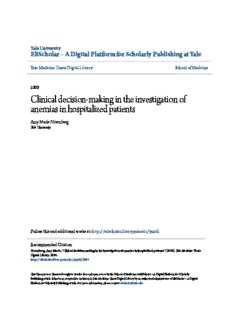
Clinical decision-making in the investigation of anemias in hospitalized patients PDF
Preview Clinical decision-making in the investigation of anemias in hospitalized patients
Yale University EliScholar – A Digital Platform for Scholarly Publishing at Yale Yale Medicine Thesis Digital Library School of Medicine 2000 Clinical decision-making in the investigation of anemias in hospitalized patients Amy Marie Nuernberg Yale University Follow this and additional works at:http://elischolar.library.yale.edu/ymtdl Recommended Citation Nuernberg, Amy Marie, "Clinical decision-making in the investigation of anemias in hospitalized patients" (2000).Yale Medicine Thesis Digital Library. 2994. http://elischolar.library.yale.edu/ymtdl/2994 This Open Access Thesis is brought to you for free and open access by the School of Medicine at EliScholar – A Digital Platform for Scholarly Publishing at Yale. It has been accepted for inclusion in Yale Medicine Thesis Digital Library by an authorized administrator of EliScholar – A Digital Platform for Scholarly Publishing at Yale. For more information, please [email protected]. YALE UNIVERSITY CUSHING/WHITNEY MEDICAL LIBRARY Permission to photocopy or microfilm processing of this thesis for the purpose of individual scholarly consultation or reference is hereby granted by the author. This permission is not to be interpreted as affecting publication of this work or otherwise placing it in the public domain, and the author reserves all rights of ownership guaranteed under common law protection of unpublished manuscripts. Date Digitized by the Internet Archive in 2017 with funding from The National Endowment for the Humanities and the Arcadia Fund https://archive.org/details/clinicaldecisionOOnuer Clinical Decision-Making in the Investigation of Anemias in Hospitalized Patients A Thesis Submitted to the Yale University School of Medicine in Partial Fulfillment of the Requirements for the Degree of Doctor of Medicine by Amy Marie Nuernberg 2000 yflif medicii uinmy JUL 2 5 2000 Abstract Clinical Decision-Making in the Investigation of Anemias in Hospitalized Patients. Amy M. Nuernberg (Sponsored by Peter McPhedran). Departments of Laboratory Medicine and Internal Medicine, Yale University School of Medicine, New Haven, CT. The present study was designed to determine the prevalence of various causes of anemia in hospitalized patients, and to examine the clinical decision-making of the medical team in evaluating those patients. Knowledge of the actual prevalence of different kinds of anemias should make work-up more efficient. We identified 99 consecutive anemic inpatients being evaluated for new anemias, defined as having one of several laboratory investigations performed to workup their anemia: serum iron, TIBC, serum ferritin, reticulocyte count, serum haptoglobin, serum folate, RBC folate, vitamin B12, or serum erythropoietin. We then followed their evaluation as documented in the medical record, assessing factors such as the clinical context of their anemia, the result of Hemoccult™ stool testing and other ancillary testing, and the major diagnoses made during their hospitalization. The most common causes of anemia were the anemia of chronic disease (37%), iron deficiency (14%), renal insufficiency (14%), and acute gastrointestinal bleeding (13%). The most commonly ordered tests were ferritin, serum iron, and TIBC in 89%, 84% and 83% of patients, respectively. Vitamin B12 and folate assays were performed in half of patients. The least commonly ordered test was serum erythropoietin in 12% of patients. While the anemia-related diagnoses in these patients were not surprising, the contribution of renal disease was often underestimated and underinvestigated. ACD and iron deficiency were generally appropriately investigated, while vitamin B12 and folate deficiency may have been overinvestigated. The pervasiveness of anemia in the hospital may lead to complacency and the misconception that anemia is normal in this population.
Description: